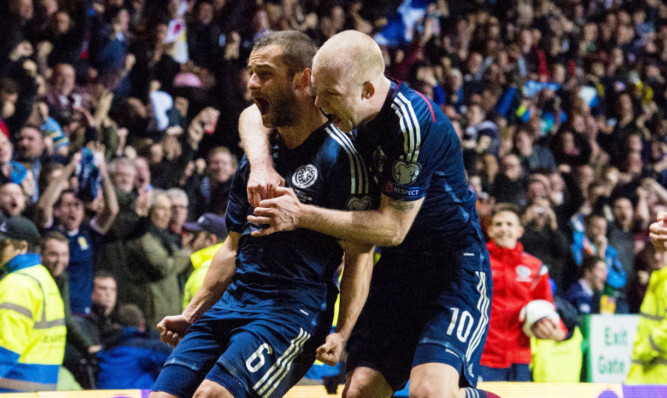Positive mental attitude.
According to Wikipedia, it’s the philosophy that having an optimistic disposition in every situation in one’s life attracts positive changes and increases achievement. It opposes negativity and hopelessness.
Optimism and hope are vital to the development of PMA, apparently.
And although that all sounds like absolute claptrap on the face of it, the success of Scotland under Gordon Strachan surely proves that whoever came up with the theory might well have a point.
I say that because Friday night’s game with the Republic of Ireland was the first time in a long while when positivity reigned on social media before, during and after the game.
In the past, when you scrolled through Twitter or Facebook before an international fixture you would get the harbingers of doom who say Scotland are going to get a doing; the completely indifferent who gave up on Scotland a long time ago; and the vocal minority who actually get behind the team and bum up their chances of getting a result.
However, since Strachan took over, the defeatist element has been slowly eradicated bit by bit and, sure enough, on Friday night the vast majority of people had the belief that Scotland might actually get a result against Ireland when it mattered most.
Perhaps the Tartan Army have been stung, hit where it hurts, far too many times to embrace a positive mental attitude.
Speaking personally, I recall many moments of doom and gloom.
It probably started when Juan Cayasso scored the winner for Costa Rica against Scotland in 1990.
It definitely worsened at the World Cup in 1998 when we went into the Morocco game with more than a shout of qualifying, and ended up being cuffed 3-0.
Of course, we’ve also had the near misses that have maybe stopped us believing that good things might actually happen. We were the nearly men against England in Euro 2000 qualifying, and ended up staying at home despite beating the English 1-0 at Wembley in the second leg.
It was the same old story four years later when we crammed into pubs and around TV sets to watch the play-off against the Netherlands, knowing that James McFadden’s strike from the first leg had us just 90 minutes away from a major tournament. Sadly we were annihilated 6-1 and not even the most positive person could spin that defeat.
Away defeats to Georgia, Macedonia, Norway they all still rankle with me and stick in the memory. Indeed, it was only 20 months ago when Wales beat us 2-1 that I walked away from Hampden thinking: “I’ll no’ be back. Never again.”
But even the most pessimistic of Scotland fans has to acknowledge that Scotland appear to have turned the corner and maybe our long-suffering supporters have too.
Whether it has had something to do with the way the fixtures have fallen this time around, I don’t know, but opening with away fixtures against the much-fancied Germany and Poland with the home game against Georgia sandwiched in between may have worked in our favour.
We were right up against it from the start but performances in all three of those games gave Scotland the players, the fans, the management the belief that we might just do it this time.
And while it was a tense old 90 minutes at Celtic Park against Ireland on Friday and more ‘kick and rush’ football was played than anything else, Scotland thoroughly deserved their win.
There is a real difference between arrogance and confidence, but I think Graeme Souness hit the nail on the head this week when he talked about having a “swagger that comes from belief”.
Scotland aren’t invincible by any means, and no-one should get carried away with how Gordon Strachan’s men have started this Euro 2016 qualifying campaign.
There may yet be some heartache to come, given just how tight Group D has become, and nobody would rule out goal difference being the latest factor to frustrate the Tartan Army when all is said and done. Let’s hope that isn’t the case.
But Scotland can and must – now go into games believing they can compete with anyone and, more importantly, believing they can get a result.
Forget what happens against England in this week’s friendly, that’s merely a sideshow.
Scotland must now look to the game against Gibraltar not thinking about the possibility of an upset, not even entertaining memories of games where we have struggled to break down the so-called diddy teams (the ridiculously late winner at home to Liechtenstein at home a few years back springs immediately to mind).
No, Scotland must go into that game trying to rack up a barrowload and stamping their authority all over the group.
That would set us up nicely for the rematch with the Republic on June 13, where all the pressure must surely be on Ireland, and then two home games against Germany and Poland.
Take positive results from all of those, and we’re certainly capable of winning at least two of the three, and then we’ll head to Faro to play Gibraltar next October with France on our minds.
The hard work has still to be done on the pitch of course, but the dour, defeatist Scotland fan must become a thing of the past.
Negativity? Down with this sort of thing.
